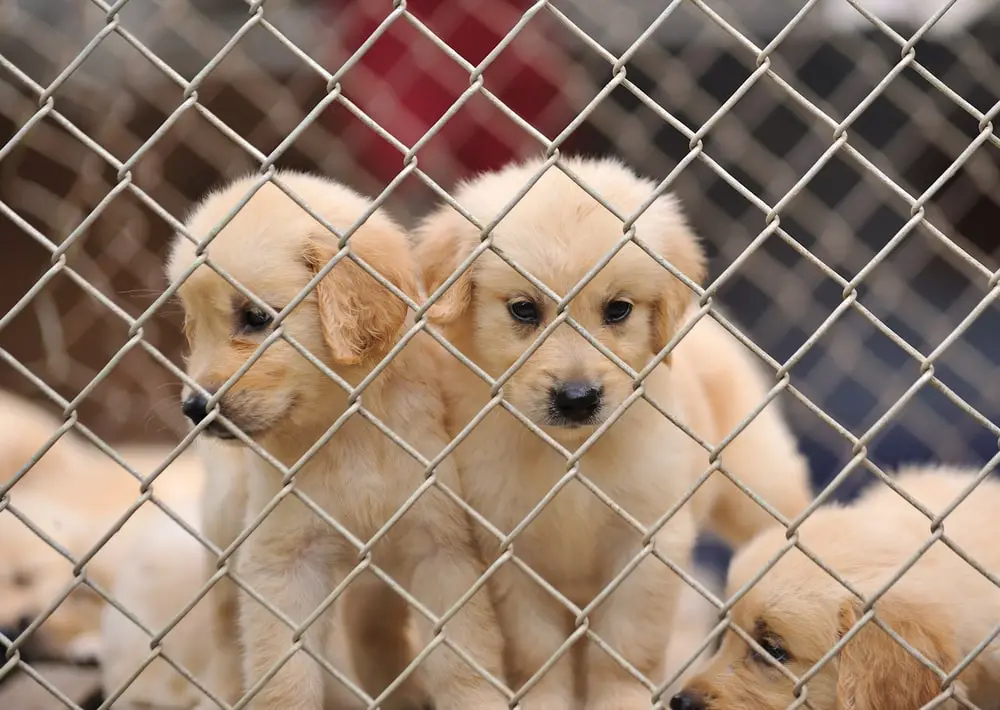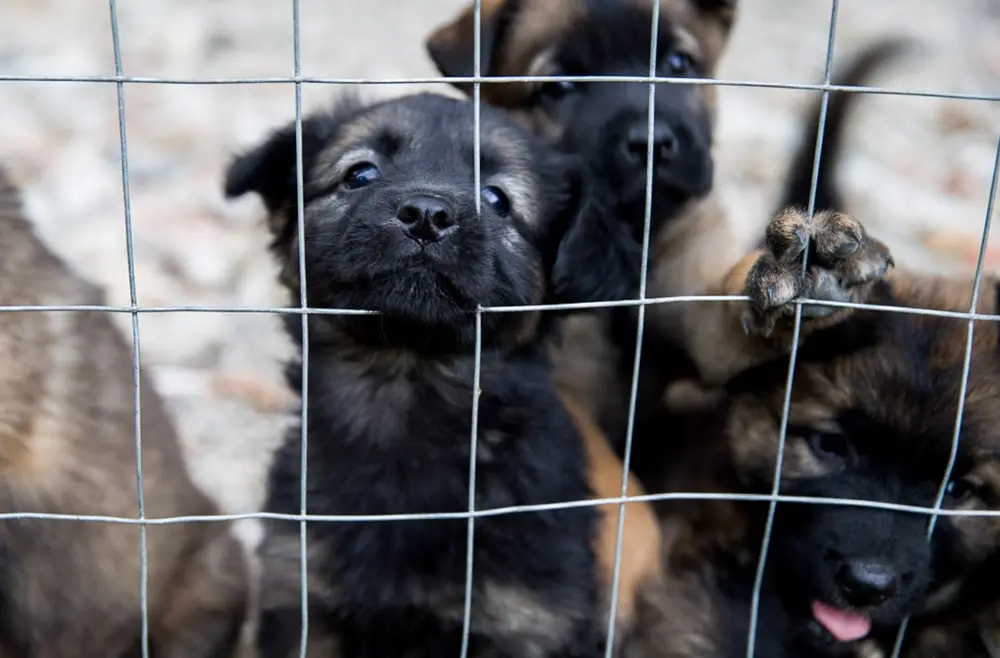BREED SPOTLIGHT
What Is a Puppy Mill and How To Spot One
If you’re looking to adopt a specific dog breed, you have a few options. You can check shelters, find a breeder, or buy from a local pet store that works with ethical organizations.
Unfortunately, many pet stores get their dogs from puppy mills, which may neglect or mistreat the animals in their care. This means that many dogs from puppy mills are generally less healthy than puppies who have been raised by responsible breeders or animal rescue services.
To find the best pup for you, it’s helpful to understand how puppy mills function, why they aren’t the best option, and how you can avoid buying a puppy from a puppy mill or a pet store that deals with them.
Why Are Puppy Mills Bad?
Legal experts define a puppy mill as a for-profit operation where owners and operators are focused on producing as many puppies as possible to sell to pet stores and private puppy buyers.1
To maximize profits, puppy mill owners may keep female dogs pregnant and nursing their whole lives or until they are unable to produce more puppies. Once their puppies are born, they also tend to keep their dogs caged and provide only minimal food, exercise, and grooming.1
This treatment may lead to puppies who are malnourished, denied routine veterinary care, and are poorly socialized. These puppies can grow into dogs with long-term health problems and usually a poorer quality of life.1
Are puppy mills illegal?
While many puppy mills are unethical in how they treat the dogs in their care, they aren’t illegal.2 The 1966 Animal Welfare Act does set minimum standards of care for commercial breeding operations and these are supposed to be enforced by the U.S. Department of Agriculture (USDA).2
Many puppy mills may have a USDA license which mandates minimum care requirements and allows them to sell their dogs to pet shops. However, the standards required for a USDA license are relatively low, and a lack of enforcement means that many puppy mills can violate even the bare minimum standards without consequences.2
What U.S. states have banned puppy mills?
According to the Animal Legal Defense Fund, currently no U.S. state has outright banned puppy mills. Puppy mills can appear in both urban areas, rural areas, and everywhere in between. This means that puppy mills may fall under different state, city, and community animal welfare laws and enforcement depending on where they are located.3
Efforts have been made to ban puppy mills in many communities, yet meaningful laws at the state level are often blocked by the pet store lobby. However, California has banned the sale of puppies from puppy mills to pet stores in the state, but hasn’t banned them entirely.3
Ready to Insure Your New Pet? Start Your Free Quote
How To Spot a Puppy Mill: Puppy Mills vs. Breeders
If you want to buy a specific breed of puppy, there are many responsible breeders who focus on raising puppies who are healthy and given proper care. If you’re not sure if you’re dealing with a puppy mill or a responsible breeder, experts have some tips.4
Visitation
The first question you can ask is whether or not you can visit the home of the person selling the animal. Puppy mills will nearly always say no, whereas responsible breeders will usually be more than happy to let you come and see their facility or home.4
If possible, get a complete tour and ask to meet the parents, siblings, and any other relatives of your puppy. Some responsible breeders won’t have the father of the puppy on-site, but they should still be able to provide you with his information and can connect you with his breeder or owner.4
Registration
Puppy mills may have a kennel license, but this is given out by the local government and only provides permission to own more dogs than what’s typically allowed in that city or area. Don’t take these too seriously if it’s the only proof they offer to prove their legitimacy.4
Most responsible dog breeders will be registered with an outside organization. Because registration is voluntary and can be expensive, it proves responsible breeders are willing to go the extra mile to ensure they’re being ethical.4
Health
The puppies should also be certified by a veterinarian. If someone can’t provide proof that their animals have already received routine veterinary care, this is a huge red flag. Puppies should get their first round of recommended vaccines at 6 – 12 weeks of age and should already have those when you can legally bring your puppy home at 8 weeks.4
You’ll often find that with puppy mills and irresponsible backyard breeders, the dogs haven’t seen a vet. This increases the chances that they will come with various unaddressed health problems and shows the breeder isn’t prioritizing the puppy’s health.4
Knowledge
A responsible breeder takes the time to learn everything they can about a breed before they start producing puppies. Find some basic and more advanced questions to ask someone to find out how much they know about the breed.4
Here are some examples of things a breeder should know about their dogs:4
- Personality traits
- Energy level
- Intelligence
- Expected lifespan
- Common genetic problems in the breed
- Average height and weight of adult animals
If you feel like the handler doesn’t know much about the breed, consider this a red flag and look out for others to determine if they’re a responsible breeder or a puppy mill.4
Number of breeds
You may want to ask a handler how many breeds they have in their care, as it can can quickly determine if you’re talking with a puppy mill or a responsible breeder.4
Because of the amount of time and care that responsible breeders put into each breed, it’s rare to find a breeder that is breeding more than one or two types of dogs at once. The vast majority only have one breed they choose to focus on.4
If someone is breeding multiple dog breeds or has a number of “designer dogs” available, this can be a huge red flag. Few responsible breeders will offer hybrid dogs and even fewer will have multiple breeds to choose from.4
Care
Something else you can ask about and look for when visiting a location is the level of care the dogs receive. They should all be getting high-quality dog food, regular grooming, and appear to be healthy.4
Look for dogs with matted coats and those that appear to be depressed as these could be signs of neglect. You’ll also want to consider how much space each animal has to roam, rest, and play, along with whether they have full access to the backyard, house, and/or facility.4
References
The final thing you can ask for is references. A responsible breeder should be able to provide you with a list of owners they’ve sold dogs to in the past, the veterinarian they take their animals for check-ups, and other dog breeders who can vouch for them.4
If you still have any doubts about the reputability of a breeder at this point, don’t be afraid to contact any references given to ask them about the individual you’re considering buying a puppy from.4
You can also contact your state Attorney General, or use the U.S. Department of Agriculture website to check inspection reports and see if there are any red flags.5
Protect Your New Puppy With Dog Insurance
Wherever you get your puppy, consider protecting them with a puppy insurance policy. Our pet insurance policies can provide the coverage and care your furry family member deserves. Get your free quote today.
We Can Help You Protect Your Pup
855-270-7387



